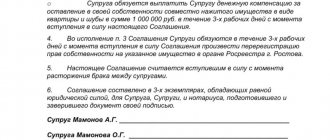What does the article regulate?
Article 38 of the Family Code of Russia regulates the division of joint property. This procedure is often controversial and difficult for both parties. The main problem is determining the amount of property that will be divided, as well as determining the share of each spouse. The legislator offers several options for solving the property problem. Spouses have the right to either reach an agreement peacefully or go to court. The latter often happens, since the dialogue between husband and wife, especially ex-wife, is often difficult.
What is divided by law between spouses during a divorce?
Often, ex-spouses, having started a divorce and subsequent division, have little idea of what property they can divide and what will remain in the possession of one of them without division.
What is shared
According to the Civil Code and the Investigative Committee of the Russian Federation, they will be able to divide only the property that they acquired during marriage, including:
- residential premises purchased during marriage;
- joint, or open to one of the spouses, but during the period of marriage, bank deposits, as well as securities, shares, bonds;
- other movable and immovable property, for example, a vehicle or land;
- debt obligations and loans;
- joint business.
What is not shared
It will not be possible to divide the personal property of either spouse, namely:
- property purchased before the start of family life;
- purchased with personal funds;
- inherited or received as a gift;
- personal belongings (except jewelry and luxury items).
The RF IC determines under what conditions personal property can become joint and will be subject to division. These are situations where personal property during the period of family life was significantly improved through investments of the personal funds of the second spouse or through joint investments.
Structure and content
Art. 38 IC of Russia includes 7 points in its structure. The content of each of them is as follows:
- Paragraph 1 allows division not only after the divorce, but also during its validity. At the request of one of the parties, everything acquired during the marriage can be divided regardless of the existence of an official divorce. This procedure is relevant in cases where creditors demand repayment of debts by one of the spouses;
- Clause 2 determines the right of the husband and wife to enter into an agreement under which the division of property is carried out. This situation is the most favorable, as it eliminates litigation, time and financial costs for both parties;
- paragraph 3 fixes the possibility of division in court if the spouses were unable to peacefully agree on the division. In this case, it is the judge who decides what share each spouse will receive and what composition of property will go to the husband and wife;
- clause 4 establishes the possibility of retaining property for each of the spouses if they actually lived separately, but did not officially dissolve the marriage;
- Paragraph 5 determines the need to leave property that was acquired for the needs of minor children without division. It remains with the spouse with whom the minor children will live in full. The same situation is with deposits that were created in the name of minors. Since the invested funds belong to the child, no division is made between them;
- paragraph 6 determines the possibility of leaving any part of the property without division. It will act after the dissolution of the marriage in the form of joint property of both persons;
- Clause 7 establishes the limitation period for cases of division of property. It is 3 years, starting from the moment of divorce.
As a result, Art. 38 IC of Russia establishes all the basic rules for the division of property. They determine the rules of conduct for each spouse when the need arises to divide everything acquired between husband and wife.
Article 38 of the RF IC. Division of common property of spouses
The most conflicting situation seems to be the division of the common property of the spouses, which most often occurs as a result of divorce. It is also necessary in the event of the death of a spouse: after all, only the property that was the property of the testator is inherited. The division of joint property can also be made during the marriage, including by the court, at the request of the spouse or at the request of his creditors. The judge must take measures to secure the claim. Since the law does not connect the possibility of dividing the common property of spouses with the dissolution of a marriage, the court does not have the right to refuse to accept a statement of claim on the grounds that the marriage between the spouses was not dissolved.
The need for such a section may be due to various reasons. For example, a spouse wants to donate part of his property to his children or he needs a division to pay personal debts. The reasons for the division may also be the actual termination of family relations or the extravagance of one of the spouses. In these and other cases, it would be unreasonable to limit the rights of spouses and make the division of their common property conditional on the dissolution of the marriage, which could encourage divorce. Therefore, the legislator assumes that spouses will continue to live in marriage after the division of property. In this case, the legal regime of joint ownership will apply to the property that will be acquired by them after the division.
The subjects of common joint property in family relationships are only spouses. In other cases, when the subjects of common property are, in addition to spouses, other persons (in a peasant (farm) household, in a privatized residential premises), the participant in the common property will demand the allocation of his share.
The rules of the commented article relate to the division of joint property of spouses only, i.e. persons in a registered marriage, and to property that is available and located either by the spouses or by third parties. If, during the consideration of the dispute in court, it turns out that one of the spouses unlawfully disposed of the property or hid it, then the court takes into account this property or its value.
Spouses, as a rule, decide on the division of joint property themselves. In the event of a dispute, the issue is referred to the court. If spouses want to resolve a dispute about the division of common property simultaneously with the divorce, then the court finds out whether the dispute about the division of spouses’ property does not affect the rights of third parties (for example, other members of a peasant (farm) enterprise, cooperative, etc.). In this case, resolution of claims for divorce and division of property in one process is not allowed, and the dispute in this part of the claim must be separated into separate proceedings.
The court first determines the composition of the property to be divided. For this purpose, property objects belonging to each spouse, things and rights belonging to children, which are not subject to division between spouses, are established and allocated. The latter include things purchased solely to meet the needs of children, deposits made in the name of children.
Things and rights acquired by spouses during the period of their separation upon termination of family relations are not subject to division. These are cases of long-term separation of spouses, when in fact family relations between them are interrupted. These do not include cases of separation of spouses due to objective reasons: one of them is on a long business trip, studying, serving in the army, etc.
Having determined the composition of the common property to be divided, the court allocates the shares due to the spouses and specific items from the common property that are allocated to each spouse based on their interests and the interests of the children. If the division of specific things in accordance with shares is impossible, the court determines monetary or other compensation to the spouse.
When determining property to be divided between spouses, the court does not have the right to deprive property owners of their legal share, in particular, when dividing a dacha, garage, or other property in the relevant cooperative.
Currently, the object of joint property subject to division are deposits made by one of the spouses to a bank or other credit institution at the expense of the spouses’ common property. Other persons cannot claim a share of the contribution. If third parties provided their funds to the spouses, then these persons have the right to demand the return of their funds on the basis of the general provisions of the Civil Code of the Russian Federation.
When dividing the spouses' deposits, the court is obliged to take into account the increase in the amount of savings as a result of the compensation payments for the deposit provided for by legislative acts and the indexation of target deposits for the purchase of passenger cars.
The issues of division and allocation of living space are of great importance. The division of a residential building owned by spouses under the right of joint ownership is most often made in kind, and since the house remains indivisible, it becomes the subject of their shared ownership. The use of the premises is carried out by agreement of the spouses or by court decision. Since participants in common shared ownership have equal rights in relation to common property in proportion to their share, the court must, when allocating a share in kind, transfer to the owner a part of the residential building and non-residential buildings corresponding to his share, if this is possible without causing disproportionate damage to the economic purpose of the building.
The division of an unfinished house requires taking into account the ability of the spouses to complete the construction of their part, as well as the obligation for the loan received to build the house.
The division of a share in a housing cooperative is very complicated. Until the final repayment of the loan, it is possible only in connection with the dissolution of the marriage and is carried out in accordance with the funds that were contributed by the spouses from their common property or from personal funds. After the full payment of the share contribution, the apartment automatically becomes the subject of ownership, and its division is carried out according to general rules, taking into account the interests of all persons who are its owners and have the legal right to use this living space. The issue of dividing the common property of a privatized apartment is resolved in a similar way. Since the allocation in kind of an isolated living space in an apartment is usually difficult, it is permissible if it is technically possible to transfer to the plaintiff an isolated part of not only residential premises, but also utility rooms (kitchen, corridor, bathroom, etc.), and separate entrance equipment. In the absence of such a possibility, the court has the right, at the request of the plaintiff, to determine the procedure for using the apartment.
If spouses are part of a peasant (farm) holding, in which, in addition to them and their minor children, there are other persons, then the division of the common property of the spouses, which is not part of the property of the peasant holding, is carried out on a general basis.
A plot of land and means of production belonging to a peasant (farm) enterprise are not subject to division when one of its members leaves the enterprise. Those who leave the farm have the right to receive monetary compensation commensurate with their share in the common ownership of this property. Only upon the termination of a peasant (farm) enterprise in connection with the withdrawal of all its members or for other reasons, the common property is subject to division according to the general rules of civil and land legislation. The shares of the members of the farm in the right of joint ownership of the property of the farm are recognized as equal, unless otherwise established by agreement between them.
This principle also applies when inheriting the property of a peasant farm. If the heirs are not members of the household, they receive an inheritance in the form of monetary compensation. This provision does not apply to personal subsidiary plots, the property of which is inherited on a general basis.
Nuances and features
There are clarifications to the courts of the Supreme Court of the Russian Federation regarding the application of Art. 38 of the RF IC, which interpret some of the nuances of the meaning of the article. For example, the question arises of determining the price of each piece of property if it is necessary to distribute it between husband and wife. According to the explanations, the value of the property is determined based on the price level at the time of consideration of the disputes.
The courts should also take into account the fact of the existence of a marriage contract. It is this document that can change the division procedure established by the legislator.
It is in such cases that the property will be divided according to the contract. By law, spouses can draw it up both before marriage and after its dissolution. In addition, it is important to consider other provisions:
- any property that the husband and wife have at the time of the dispute is considered in the division procedure;
- Not only property assets are divided, but also the debts of the spouses, as well as their obligations that arose in the interests of the family.
In addition to this article, judges must comprehensively take into account the provisions of the RF IC in the field of determining the property that is not subject to division.
Thus, Article 38 of the IC of Russia defines the main rules on the division of joint property of a husband and wife. Knowing it is relevant for everyone who is married and plans to enter into a legal marriage.
The procedure for dividing property
The division is made after drawing up a written agreement in a simple form. The document sets out a list of items and the order of its distribution between spouses, and the signatures of the husband and wife are affixed. It is not necessary to have such an agreement certified by a notary, but such certification will be a guarantee of authenticity, and none of the spouses will be able to pretend that the document did not exist.
If one of the parties disagrees, the divorce case is sent to court. Sometimes the issue of divorce and division of property is resolved at the same time at a court hearing. But if one of the parties during the division affects the interests of a third party, for example, children, members of the cooperative and others, then a decision on divorce is made, and the division of property is separated into a separate proceeding.
Division of property during divorce
If divorce has become inevitable, and no preliminary agreements on the division of property have been accepted, then the Family Code on the division of property provides for three main scenarios for the development of events:
- signing a preliminary voluntary agreement on the division of property;
- a settlement agreement directly in court (can be concluded at any stage of the process before a decision is made);
- division of property by the court.
It is important to understand that according to the Family Code, divorce and division of property in the first two cases are the most painless. Here the parties can easily make some concessions to each other, and the procedure for formalizing the termination of relations begins to be formal.
It's worse when there is no prior consent. Then, during a divorce, the Family Code provides for the division of property in equal shares (the general rule). Of course, there are adjustments for children. The parent who will have to raise them in the future is legally entitled to receive more property, including the children. And even if the parties agree to divide everything equally, it will not be difficult to recognize such agreements as invalid in the future.
Spouses' shares
The constitutional principle of equality is enshrined at the legislative level between spouses in marriage. A husband or wife cannot be better on social or religious grounds, depending on their nationality or the amount of money they earn. Even if one of the spouses has never worked for good reasons, this does not deprive him of his share in the joint property.
The RF IC provides for the right to an equal share of spouses in joint property. In defense of women who, throughout their entire marriage relationship, did not work and were engaged in housekeeping and raising children, it should be noted that their shares in joint property do not decrease.
Division of property in court
If the couple could not agree peacefully on the division of property, then the case will be heard in court. A statement of claim is drawn up, a receipt for payment of the state duty is attached, and the entire package of documents is submitted to the judicial authority. Article 333.19 of the Tax Code of the Russian Federation determines the amount of state duty. The amount of the state fee and details for payment can also be found on the court’s website. Keep in mind that each claim specified in the claim is subject to state duty.
Jurisdiction
Jurisdiction must be respected. If the value of the property is up to 50 thousand rubles, the claim is filed in the magistrate’s court. If the value of the property is more than 50 thousand rubles, you need to apply to the district or city court at the location of the property (real estate) or the defendant’s place of residence. The statement of claim is drawn up in several copies. The number of copies must correspond to the number of parties participating in the process.
Claims for different property are drawn up differently. “A statement of claim for the division of a privatized apartment” will differ from a “Statement of claim for the division of a loan”
Documents that must be attached to the statement of claim:
- marriage certificate or divorce certificate
- birth certificates for children under 18 years of age
- title documents for property (purchase and sale agreements)
- documents proving payment for the property (checks, bank statements, receipts)
- act of valuation of disputed property
- document confirming payment of state duty
Features of divorce proceedings
Now a little about the features of divorce proceedings. In all of this, before you start dividing anything, it is important to understand what is actually being divided. Before starting the division of property, Article 37 of the Family Code provides for a definition of what actually is the joint property of the spouses.
It is not difficult to prove this if there is documentary evidence of financial investments in repairs, modernization, improvement, and processing. When this happens, the likelihood of one spouse increasing their share increases significantly.
It is important to understand that if the spouses lived in a civil marriage, dividing jointly acquired property can be very problematic. The legislation of the Russian Federation does not provide for the protection of the rights of a couple who lived without formalizing a marital relationship. In this case, only children born in such couples are protected.
You can prove your right to a specific thing only by providing written confirmation in court that you personally bought it (receipt, check, contract). Therefore, it is very important to legalize your relationship in order to have the protection provided by law.
Remember, breaking up a relationship is a difficult psychological barrier. But if you prepare for it in advance, then this procedure will pass just like another nuisance, without leaving a heavy black sediment in your soul.
What is subject to division?
When the process of dividing property begins, you should not forget some features. Today, the Family Code under the division of property of spouses means not only things that belonged to them by right of joint ownership, but also obligations that arose in the course of family life.
This should include:
- mortgage;
- loans;
- loans;
- family debts.
Thus, if there is no preliminary agreement between the spouses about who voluntarily assumes obligations and on what issues, according to the Family Code, the division of jointly acquired property will be made equally. According to this principle, in addition to property, the family’s debts will be equally divided, regardless of who acquired them and when.
Of course, in the Family Code of the Russian Federation, the division of spouses’ property can be carried out by prior agreement or marriage contract. But if such a section infringes on one of the parties, it will not be difficult to challenge such a decision in court. Therefore, the ideal solution is to find a compromise.
This could be the repurchase by one of the parties of its share of the property complex or the payment of its debts, a concession in another part of the property, so that ultimately the amount of property received by each of the spouses is equal (taking into account the share due to the children).
Is it possible to divorce a pregnant wife under the RF IC?
There are cases provided for by the Family Code of the Russian Federation when a husband cannot submit an application to the registry office or court for divorce. Such an appeal will not be considered. Cases in which divorce on the initiative of the husband without the consent of the wife is impossible are described in Article 17 of the IC of Russia. These include:
- wife's pregnancy;
- having a joint child under the age of 1 year.
Moreover, the application from the wife under the same conditions will be accepted and will become the basis for the termination of cancer. The husband can only wait for the moment when it becomes possible to dissolve the marriage or save it by all available means.
How to divide jointly acquired property during a divorce by agreement
It is possible to divide joint property by voluntary agreement only in cases where the married couple was able to agree on the order and procedure for the division.
But if you just take a piece of paper, describe who gets what and sign it, then the agreement will not be considered legitimate.
A voluntary agreement is an official document that must contain the following points:
- Listing of all joint property that is planned to be divided. In this case, each item must be described in detail, for example, an apartment with an area of __ square meters. meters, located at ___, or a car brand ___ license plate ___.
- Section order. In this paragraph it is necessary to indicate to which of the signatories what property is transferred or what share of the joint property goes to whom.
- It is mandatory to have the document certified by a notary office; without this, the agreement will be considered invalid and will not have legal force.
Different joint property is divided in different ways. For example, an agreement on the division of a mortgaged apartment will differ significantly from a document on the division of debts and loans, and an agreement on the division of a land plot from an agreement on the division of a residential building.
How to draw up an agreement on the division of property
The text of the document must be written in legally competent language and must not contain grammatical or stylistic errors. Document contents:
- Preamble . The place and date of drawing up the contract are indicated. The parties to the agreement are indicated: party 1 – full name, party 2 – full name.
- Subject of the agreement . It is necessary to indicate the civil status of the spouses (married, dissolved union, etc.) and list all joint property owned by the spouses at the time of conclusion of the agreement.
- Section order . Here the parties must indicate which of the joint property is transferred to whom, for example, a plot of land with an area of ___ square meters. meters, located at the address ___ goes full name, cottage area ___ sq. meters, located at the address ___ goes full name.
- Section conditions and procedure . The conditions and procedure for the transfer of each item of joint ownership and the amount of monetary compensation in the event of impossibility of physical division are described, for example, a vehicle is transferred into ownership of a citizen Full Name, in return he pays monetary compensation in the amount of half the cost of the car to a citizen Full Name.
- Personal property . A mandatory item if one of the spouses has personal property that is not subject to division. This clause is necessary to ensure that no claims or disputes arise in the future regarding property not specified in the contract.
- The procedure for the agreement to enter into legal force . It is indicated when or after the occurrence of which events the agreement begins to take effect. For example, an agreement comes into force after it is notarized, or a document comes into force after the official divorce.
- Final provisions . A fairly important point that indicates information about the number of copies and to whom each of them is transferred. Also in this paragraph it is necessary to specify the procedure for making any additional changes if necessary and indicate in what order all possible disputes that may arise during the execution of the document should be considered.
- Signatures . The agreement is sealed with the signatures of the parties; it is desirable that, in addition to the signatures, the parties write their surname and initials in their own hand.
Price
The cost of drawing up a voluntary agreement is much lower than the cost of dividing joint property in court, but you will still have to pay a certain amount.
If the spouses cannot independently draw up a document on voluntary separation, then they can turn to a notary office for help, in which case they will have to pay from three to five thousand rubles for the provision of technical services (drawing up the text of a voluntary agreement).
In addition, at the time the notary certifies the document, it will be necessary to pay a certain amount depending on the value of the property being divided, according to the established notary tariff, plus a certain amount to the notary personally (this amount depends on the prices of the given notary office).
Family Code of Ukraine
The Family Code of Ukraine has much in common with Russian legislation. It contains answers to all questions about the division of property, divorce, and the situation of children after it. SKU sets the minimum amount of alimony equal to 30% of the subsistence level. This allows us to protect the rights of children and ensure their interests.
The IC U determines the procedure for divorce, both by mutual consent of the spouses and in the absence of it.
Thus, family law is designed to regulate all legal aspects of family life, from the procedure for concluding a marriage to resolving issues related to its dissolution. The rights of parents, the interests of children, the procedure for dividing jointly acquired property and other issues are resolved exclusively in accordance with the norms of the RF IC.






